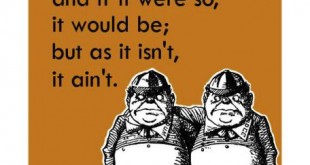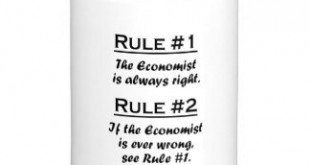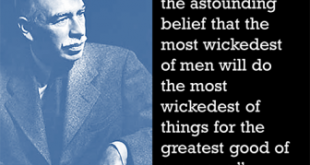Additivity — a dangerous assumption The unpopularity of the principle of organic unities shows very clearly how great is the danger of the assumption of unproved additive formulas. The fallacy, of which ignorance of organic unity is a particular instance, may perhaps be mathematically represented thus: suppose f(x) is the goodness of x and f(y) is the goodness of y. It is then assumed that the goodness of x and y together is f(x) + f(y) when it is clearly f(x + y) and only in special cases...
Read More »Axiomatic economics — the Bourbaki-Debreu delusion
Axiomatic economics — the Bourbaki-Debreu delusion By the time that we have arrived at the peak first climbed by Arrow and Debreu, the central question boils down to something rather simple. We can phrase the question in the context of an exchange economy, but producers can be, and are, incorporated in the model. There is a rather arid economic environment referred to as a purely competitive market in which individuals receive signals as to the prices of all goods. All the individuals have...
Read More »‘Deep parameters’ and microfoundations
‘Deep parameters’ and microfoundations In a post last week, Simon Wren-Lewis was discussing if modern academic macroeconomics is eclectic or not. When it comes to methodology it seems as though his conclusion is that it is not: The New Classical Counter Revolution of the 1970s and 1980s … was primarily a revolution about methodology, about arguing that all models should be microfounded, and in terms of mainstream macro it was completely successful. It also tried to link this to a...
Read More »The gussied up economics of Tweedledum and Tweedledee
The gussied up economics of Tweedledum and Tweedledee “Of course, there were exceptions to these trends: a few economists challenged the assumption of rational behavior, questioned the belief that financial markets can be trusted and pointed to the long history of financial crises that had devastating economic consequences. But they were swimming against the tide, unable to make much headway against a pervasive and, in retrospect, foolish complacency.” —Paul Krugman, New York Times...
Read More »Wren-Lewis and the Rodrik smorgasbord view of economic models
Wren-Lewis and the Rodrik smorgasbord view of economic models In December 2015 yours truly run a series of eight posts on this blog discussing Dani Rodrik‘s Economics Rules (Oxford University Press, 2015). There sure is much in the book I like and appreciate. It is one of those rare examples where a mainstream economist — instead of just looking the other way — takes his time to ponder on the tough and deep science-theoretic and methodological questions that underpin the economics...
Read More »Blue In Green
[embedded content]
Read More »When will Krugman catch up with Keynes?
When will Krugman catch up with Keynes? In his column this morning, Paul Krugman, had this to say about issues that have mattered a lot to me over many years now. I admire Krugman, of course, but this is bullshit, pure and simple. Not the Harry Frankfurt kind, which requires willful ignorance of the facts, but the everyday kind, which requires mere ignorance of the historical record. “Don’t say that redistribution is inherently wrong. Even if high incomes perfectly reflected productivity,...
Read More »Wren-Lewis on macroeconomic eclecticism
Wren-Lewis on macroeconomic eclecticism Oxford macroeconomist Simon Wren-Lewis has a post up today on his blog discussing whether mainstream macroeconomics is eclectic or not. His answer is — both yes and no: Does this mean academic macroeconomics is fragmented into lots of cliques, some big and some small? Not really … This is because these models (unlike those of 40+ years ago) use a common language … It means that the range of assumptions that models (DSGE models if you like) can make...
Read More »Heroes
[embedded content]
Read More »Models and forecasts
Yesterday John Kay had an interesting article about models and forecasting in Financial Times: A bane of this economist’s life is the belief that economics is clairvoyance. I should, according to this view, be offering prognostications of what gross domestic product growth will be this year and when the central bank will raise interest rates … What was the right answer on January 1 1989 to the question “will the Berlin Wall be pulled down in 1989?” A shrewd commentator would have said...
Read More » Heterodox
Heterodox







